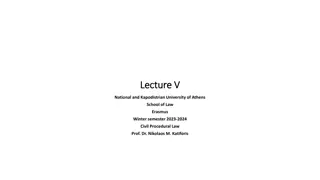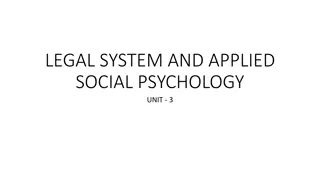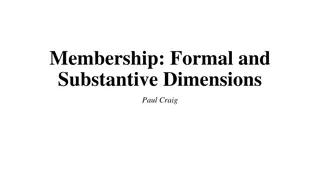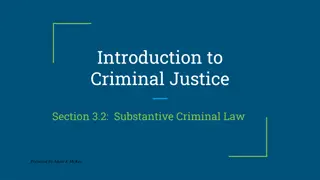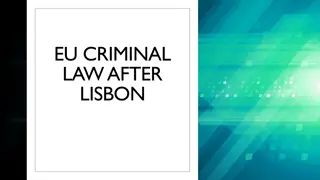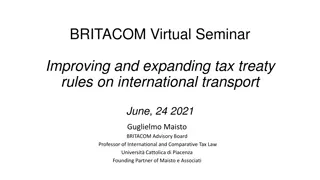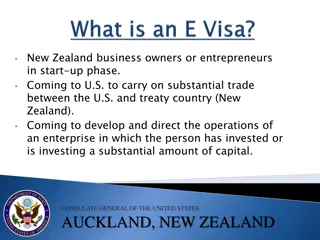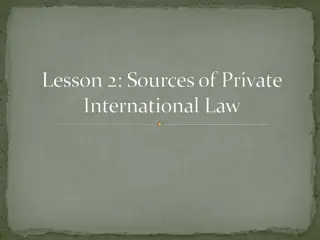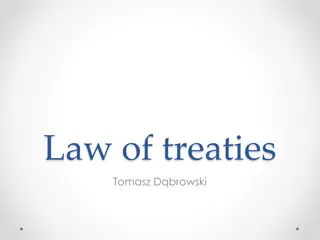Harmonisation of Substantive Criminal Law in the EU: Treaty of Lisbon
The Treaty of Lisbon provides a legal basis for the harmonisation of substantive criminal law in the European Union through mutual recognition of judgments and directives establishing minimum rules for defining criminal offences and sanctions. Areas of crime covered include terrorism, human trafficking, drug trafficking, money laundering, and more. Harmonisation aims to combat serious cross-border crimes effectively.
Download Presentation

Please find below an Image/Link to download the presentation.
The content on the website is provided AS IS for your information and personal use only. It may not be sold, licensed, or shared on other websites without obtaining consent from the author.If you encounter any issues during the download, it is possible that the publisher has removed the file from their server.
You are allowed to download the files provided on this website for personal or commercial use, subject to the condition that they are used lawfully. All files are the property of their respective owners.
The content on the website is provided AS IS for your information and personal use only. It may not be sold, licensed, or shared on other websites without obtaining consent from the author.
E N D
Presentation Transcript
Harmonisation of substantive criminal law in the EU
Treaty Treaty of of Lisbon Lisbon legal legal basis basis of of harmonisation harmonisation Article 82 Judicial cooperation in criminal matters in the Union shall be based on the principle of mutual recognition of judgments and judicial decisions and shall include the approximation of the laws and regulations of the Member States in the areas referred to in paragraph 2 (criminal procedure rules) and in Article 83 (substantive criminal law).
Treaty Treaty of of Lisbon Lisbon legal legal basis basis of of harmonisation harmonisation Article 83 1. The European Parliament and the Council may, by means of directives adopted in accordance with the ordinary legislative procedure, establish minimum rules concerning the definition of criminal offences and sanctions in the areas of particularly serious crime with a cross-border dimension resulting from the nature or impact of such offences or from a special need to combat them on a common basis.
Treaty Treaty of of Lisbon Lisbon legal legal basis basis of of harmonisation harmonisation Article 83 These areas of crime are the following: terrorism, trafficking in human beings and sexual exploitation of women and children, illicit drug trafficking, illicit arms trafficking, money laundering, corruption, counterfeiting of means of payment, computer crime, organised crime.
Treaty Treaty of of Lisbon Lisbon legal legal basis basis of of harmonisation harmonisation Article 83 2. If the approximation of criminal laws and regulations of the Member States proves essential to ensure the effective implementation of a Union policy in an area which has been subject to harmonisation measures, directives may establish minimum rules with regard to the definition of criminal offences and sanctions in the area concerned. Such directives shall be adopted by the same ordinary or special legislative procedure as was followed for the adoption of the harmonisation measures in question
Positive Positive and and negative negative integration integration Negative harmonisation side effect of four freedoms Positive harmonisation Framework decisions only one framework decision left in a substantive crminal law area: Council Framework Decision 2008/913/JHA of 28 November 2008 on combating certain forms and expressions of racism and xenophobia by means of criminal law Directives: relatively new instrument in the EU substantive criminal law area (after the Lisbon Treaty)
Negative Negative integration integration/ /harmonisation harmonisation Case C-55/94, Reinhard Gebhard v. Consiglio dell Ordine degli Avvocati e Procuratori di Milano,1995 37 It follows, however, from the Court' s case-law that national measures liable to hinder or make less attractive the exercise of fundamental freedoms guaranteed by the Treaty must fulfil four conditions: they must be applied in a non-discriminatory manner; they must be justified by imperative requirements in the general interest; they must be suitable for securing the attainment of the objective which they pursue; and they must not go beyond what is necessary in order to attain it.
Why Why is is there crminal crminal law? there a a need law? need to to harmonise harmonise substantive substantive 1. Complimentary measure to mutual recognition of decisions in criminal matters (harmonised criminal law makes it easier to accept foreign decisions in criminal cases and execute them; enhances mutual trust, particular importance in cases where double criminality principle is not applicable). 2. Protection of EU financial interests and effectiveness of EU policies (EU Directive on the protection of the euro, PIF Directive combating fraud). 3. Safeguarding citizens well-being in the area of freedom, security and justice and basic values of the EU (e.g. fight against terrorism, human trafficking, sexual exploitation of children). 4. Strenghtening the ability to effectively combat crime at national level in cases of transnational criminality.
Framework Framework decision decision 2008/913 2008/913 Council Framework Decision 2008/913/JHA of 28 November 2008 on combating certain forms and expressions of racism and xenophobia by means of criminal law 1. Definitions of offences 2. Liability of legal persons (article 5 6) 3. Effective investigative measures (article 7-8)
Is Is racism racism/ /anti problem in Europe? problem in Europe? anti- -Semitism Semitism/ /disrimination disrimination still still a a What do you think? Do you know any examples of racism/xenofobia/discrimination? Is there any changes in the society? What is a hate speach? Is it something similar to racism etc.?
Framework Framework decision decision 2008/913 2008/913 Offences concerning racism and xenophobia 1. Each Member State shall take the measures necessary to ensure that the following intentional conduct is punishable: (a) publicly inciting to violence or hatred directed against a group of persons or a member of such a group defined by reference to race, colour, religion, descent or national or ethnic origin; (b) the commission of an act referred to in point (a) by public dissemination or distribution of tracts, pictures or other material; (c) publicly condoning, denying or grossly trivialising crimes of genocide, crimes against humanity and war crimes as defined in Articles 6, 7 and 8 of the Statute of the International Criminal Court, directed against a group of persons or a member of such a group defined by reference to race, colour, religion, descent or national or ethnic origin when the conduct is carried out in a manner likely to incite to violence or hatred against such a group or a member of such a group; (d) publicly condoning, denying or grossly trivialising the crimes defined in Article 6 of the Charter of the International Military Tribunal appended to the London Agreement of 8 August 1945, directed against a group of persons or a member of such a group defined by reference to race, colour, religion, descent or national or ethnic origin when the conduct is carried out in a manner likely to incite to violence or hatred against such a group or a member of such a group.
Framework Framework decision decision 2008/913 2008/913 Article 3 Criminal penalties 1. Each Member State shall take the necessary measures to ensure that the conduct referred to in Articles 1 and 2 is punishable by effective, proportionate and dissuasive criminal penalties. 2. Each Member State shall take the necessary measures to ensure that the conduct referred to in Article 1 is punishable by criminal penalties of a maximum of at least between 1 and 3 years of imprisonment.
New initiative On Communication on 'A more inclusive and protective Europe: extending the list of EU crimes to hate speech and hate crime' which aims to trigger a Council Decision extending to hate crime and hate speech the current list of so-called EU crimes as laid down in Art 83 TFEU. Such decision would enable the Commission, in a second stage, to strengthen the legal framework on tackling hate speech and hate crime across the EU. https://commission.europa.eu/strategy-and-policy/policies/justice- and-fundamental-rights/combatting-discrimination/racism-and- xenophobia/extending-eu-crimes-hate-speech-and-hate-crime_en 9 December 2021, the Commission adopted a
New initiative As a second step, the Commission may propose the adoption of directives establishing minimum rules on the definitions and sanctions of hate speech and hate crime to be adopted by the European Parliament and the Council in line with the ordinary legislative procedure. Rights of the minorities should be more protected. There are several plans/programms: EU Anti-racism Action Plan 2020-2025 Union of Equality: LGBTIQ Equality Strategy 2020-2025 U strategy on Combating Antisemitism and Fostering Jewish Life (2021-2030)
Hate speach against LGBTQ community E.g.: Russia: https://www.reuters.com/article/us-russia-lgbt-crime- idUSKBN1DL2FM Poland (vice Minister of Justice): https://twitter.com/marcinwarchol/status/1609282119724834817?la ng=en
Holocaust denial https://www.europarl.europa.eu/RegData/etudes/BRIE/2021/698043 /EPRS_BRI(2021)698043_EN.pdf See also: https://hudoc.echr.coe.int/eng#{%22itemid%22:[%22001- 72786%22]} Witsch v. Germany
Gender-based violence and EU EU can can ratify the Istanbul Convention OPINION 1/19 OF THE COURT (Grand Chamber); 6 October 2021: https://curia.europa.eu/juris/document/document.jsf?text=&docid=247081& pageIndex=0&doclang=EN&mode=lst&dir=&occ=first&part=1&cid=11501 Council of Europe Convention on preventing and combating violence against women and domestic violence https://www.coe.int/en/web/istanbul-convention/home?
Istambul convention article 1 The purposes of this Convention are to: protect women against all forms of violence, and prevent, prosecute and eliminate violence against women and domestic violence; contribute to the elimination of all forms of discrimination against women and promote substantive equality between women and men, including by empowering women; design a comprehensive framework, policies and measures for the protection of and assistance to all victims of violence against women and domestic violence; promote international co-operation with a view to eliminating violence against women and domestic violence; provide support and assistance to organisations and law enforcement agencies to effectively co-operate in order to adopt an integrated approach to eliminating violence against women and domestic violence. 2 In order to ensure effective implementation of its provisions by the Parties, this Convention establishes a specific monitoring mechanism.
Definitions article 3 violence against women is understood as a violation of human rights and a form of discrimination against women and shall mean all acts of gender-based violence that result in, or are likely to result in, physical, sexual, psychological or economic harm or suffering to women, including threats of such acts, coercion or arbitrary deprivation of liberty, whether occurring in public or in private life; domestic violence shall mean all acts of physical, sexual, psychological or economic violence that occur within the family or domestic unit or between former or current spouses or partners, whether or not the perpetrator shares or has shared the same residence with the victim;
Substantive criminal law provisions Article 32 Civil consequences of forced marriages Parties shall take the necessary legislative or other measures to ensure that marriages concluded under force may be voidable, annulled or dissolved without undue financial or administrative burden placed on the victim. Article 33 Psychological violence Parties shall take the necessary legislative or other measures to ensure that the intentional conduct of seriously impairing a person s psychological integrity through coercion or threats is criminalised. Article 34 Stalking Parties shall take the necessary legislative or other measures to ensure that the intentional conduct of repeatedly engaging in threatening conduct directed at another person, causing her or him to fear for her or his safety, is criminalised. Article 35 Physical violence Parties shall take the necessary legislative or other measures to ensure that the intentional conduct of committing acts of physical violence against another person is criminalised.
Substantive criminal law provisions Article 36 Sexual violence, including rape Parties shall take the necessary legislative or other measures to ensure that the following intentional conducts are criminalised: A) engaging in non-consensual vaginal, anal or oral penetration of a sexual nature of the body of another person with any bodily part or object; B) engaging in other non-consensual acts of a sexual nature with a person; C) causing another person to engage in non-consensual acts of a sexual nature with a third person. 2 Consent must be given voluntarily as the result of the person s free will assessed in the context of the surrounding circumstances. 3 Parties shall take the necessary legislative or other measures to ensure that the provisions of paragraph 1 also apply to acts committed against former or current spouses or partners as recognised by internal law.
Substantive criminal law provisions Article 37 Forced marriage 1. Parties shall take the necessary legislative or other measures to ensure that the intentional conduct of forcing an adult or a child to enter into a marriage is criminalised. 2. Parties shall take the necessary legislative or other measures to ensure that the intentional conduct of luring an adult or a child to the territory of a Party or State other than the one she or he resides in with the purpose of forcing this adult or child to enter into a marriage is criminalised. Article 38 Female genital mutilation Parties shall take the necessary legislative or other measures to ensure that the following intentional conducts are criminalised: excising, infibulating or performing any other mutilation to the whole or any part of a woman s labia majora, labia minora or clitoris; coercing or procuring a woman to undergo any of the acts listed in point a; inciting, coercing or procuring a girl to undergo any of the acts listed in point a.
Substantive criminal law provisions Article 39 Forced abortion and forced sterilisation Parties shall take the necessary legislative or other measures to ensure that the following intentional conducts are criminalised: A) performing an abortion on a woman without her prior and informed consent; B) performing surgery which has the purpose or effect of terminating a woman s capacity to naturally reproduce without her prior and informed consent or understanding of the procedure. Article 40 Sexual harassment Parties shall take the necessary legislative or other measures to ensure that any form of unwanted verbal, non-verbal or physical conduct of a sexual nature with the purpose or effect of violating the dignity of a person, in particular when creating an intimidating, hostile, degrading, humiliating or offensive environment, is subject to criminal or other legal sanction.
What is the definitione of rape? Poland: Whoever, by force, illegal threat or deceit subjects another person to sexual intercourse shall be subject to the penalty of the deprivation of liberty for a term of between 2 and 12 years. If the perpetrator, in the manner specified in 1, makes another person submit to other sexual act or to perform such an act, he shall be subject to the penalty of the deprivation of liberty for a term of between 6 months and 8 years. If the perpetrator commits the rape 1) in common with another person, 2) against a minor under 15 years of age, 3) against an ascendant, descendant, or a person being adopted, or brother or sister, he shall be subject to the penalty of deprivation of liberty for a minimum term of 3 years. If the perpetrator of the crime specified in 1 - 3 acts with particular cruelty, he shall be subject to the penalty of deprivation of liberty for a minimum term of 5 years.
What is the definitione of rape? Spain: When the sexual assault consists of vaginal,anal or oral penetration,or inserting body parts or objects into either of the former two orifices,the offender shall be convicted of rape with a sentence of imprisonment from six to twelve years. Sweden: When someone, by assault or otherwise with violence or by the threat of a criminal act, compels a person to have sexual intercourse or a comparable sexual act. ObservationsRape may also be committed when the victim has not been compelled, but the perpetrator has improperly exploited the fact that a person is in a helpless state, owing to, for instance, unconsciousness, sleep, intoxication or other influence of drugs, illness, bodily injury or mental impairment. https://eige.europa.eu/gender-based-violence/regulatory-and-legal- framework
How rape should be prosecuted? Article 55 Ex parte and ex officio proceedings 1 Parties shall ensure that investigations into or prosecution of offences established in accordance with Articles 35, 36, 37, 38 and 39 of this Convention shall not be wholly dependant upon a report or complaint filed by a victim if the offence was committed in whole or in part on its territory, and that the proceedings may continue even if the victim withdraws her or his statement or complaint. 2 Parties shall take the necessary legislative or other measures to ensure, in accordance with the conditions provided for by their internal law, the possibility for governmental and nongovernmental organisations and domestic violence counsellors to assist and/or suport victims, at their request, during investigations and judicial proceedings concerning the offences established in accordance with this Convention.
D Directive irective 2011/92 2011/92 Directive 2011/92/eu of the European Parliament and of the Council of 13 December 2011 on combating the sexual abuse and sexual exploitation of children and child pornography, and replacing Council Framework Decision 2004/68/JHA Recital 6: Serious criminal offences such as the sexual exploitation of children and child pornography require a comprehensive approach covering the prosecution of offenders, the protection of child victims, and prevention of the phenomenon. The child s best interests must be a primary consideration when carrying out any measures to combat these offences in accordance with the Charter of Fundamental Rights of the European Union and the United Nations Convention on the Rights of the Child.
D Directive irective 2011/92 2011/92 Recital 40 Where the danger posed by the offenders and the possible risks of repetition of the offences make it appropriate, convicted offenders should be temporarily or permanently prevented from exercising at least professional activities involving direct and regular contacts with children. Employers when recruiting for a post involving direct and regular contact with children are entitled to be informed of existing convictions for sexual offences against children entered in the criminal record, or of existing disqualifications. For the purposes of this Directive, the term employers should also cover persons running an organisation that is active in volunteer work related to the supervision and/or care of children involving direct and regular contact with children. The manner in which such information is delivered, such as for example access via the person concerned, and the precise content of the information, the meaning of organised voluntary activities and direct and regular contact with children should be laid down in accordance with national law. https://rps.ms.gov.pl/pl-PL/Public#/ Sex Offenders Register What do you think about this register? Should it be public and avaliable to everyone?
D Directive irective 2011/92 2011/92 1. Definitions 2. Lists of ofences which should be penalised in the Member States 3. Liablity of legal persons article 11-12 4. Obligation to introduce effective investigation measures article 15-17; 21-25 5. Protection of victims article 18-20 6. Cooperation between Member States
D Directive irective 2011/92 Article 2 For the purposes of this Directive, the following definitions apply: (a) child means any person below the age of 18 years; (b) age of sexual consent means the age below which, in accordance with national law, it is prohibited to engage in sexual activities with a child; (c) child pornography means: (i) any material that visually depicts a child engaged in real or simulated sexually explicit conduct; (ii) any depiction of the sexual organs of a child for primarily sexual purposes; (iii) any material that visually depicts any person appearing to be a child engaged in real or simulated sexually explicit conduct or any depiction of the sexual organs of any person appearing to be a child, for primarily sexual purposes; or (iv) realistic images of a child engaged in sexually explicit conduct or realistic images of the sexual organs of a child, for primarily sexual purposes; (d) child prostitution means the use of a child for sexual activities where money or any other form of remuneration or consideration is given or promised as payment in exchange for the child engaging in sexual activities, regardless of whether that payment, promise or consideration is made to the child or to a third party; (e) pornographic performance means a live exhibition aimed at an audience, including by means of information and communication technology, of: (i) a child engaged in real or simulated sexually explicit conduct; or (ii) the sexual organs of a child for primarily sexual purposes; (f) legal person means an entity having legal personality under the applicable law, except for States or public bodies in the exercise of State authority and for public international organisations. 2011/92
D Directive irective 2011/92 2011/92 Article 3 Offences concerning sexual abuse Member States shall take the necessary measures to ensure that the intentional conduct referred to in paragraphs 2 to 6 is punishable. 2. Causing, for sexual purposes, a child who has not reached the age of sexual consent to witness sexual activities, even without having to participate, shall be punishable by a maximum term of imprisonment of at least 1 year. 3. Causing, for sexual purposes, a child who has not reached the age of sexual consent to witness sexual abuse, even without having to participate, shall be punishable by a maximum term of imprisonment of at least 2 years. 4. Engaging in sexual activities with a child who has not reached the age of sexual consent shall be punishable by a maximum term of imprisonment of at least 5 years. 6. Coercing, forcing or threatening a child into sexual activities with a third party shall be punishable by a maximum term of imprisonment of at least 10 years if the child has not reached the age of sexual consent, and of at least 5 years of imprisonment if the child is over that age. 1.
D Directive irective 2011/92 2011/92 Article 3 Offences concerning sexual abuse 5. Engaging in sexual activities with a child, where: (i) abuse is made of a recognised position of trust, authority or influence over the child, shall be punishable by a maximum term of imprisonment of at least 8 years if the child has not reached the age of sexual consent, and of at least 3 years of imprisonment, if the child is over that age; or (ii) abuse is made of a particularly vulnerable situation of the child, in particular because of a mental or physical disability or a situation of dependence, shall be punishable by a maximum term of imprisonment of at least 8 years if the child has not reached the age of sexual consent, and of at least 3 years of imprisonment if the child is over that age; or (iii) use is made of coercion, force or threats shall be punishable by a maximum term of imprisonment of at least 10 years if the child has not reached the age of sexual consent, and of at least 5 years of imprisonment if the child is over that age.
D Directive irective 2011/92 2011/92 Article 4 Offences concerning sexual exploitation 1. Member States shall take the necessary measures to ensure that the intentional conduct referred to in paragraphs 2 to 7 is punishable. 2. Causing or recruiting a child to participate in pornographic performances, or profiting from or otherwise exploiting a child for such purposes shall be punishable by a maximum term of imprisonment of at least 5 years if the child has not reached the age of sexual consent and of at least 2 years of imprisonment if the child is over that age. 3. Coercing or forcing a child to participate in pornographic performances, or threatening a child for such purposes shall be punishable by a maximum term of imprisonment of at least 8 years if the child has not reached the age of sexual consent, and of at least 5 years of imprisonment if the child is over that age. 4. Knowingly attending pornographic performances involving the participation of a child shall be punishable by a maximum term of imprisonment of at least 2 years if the child has not reached the age of sexual consent, and of at least 1 year of imprisonment if the child is over that age. 5. Causing or recruiting a child to participate in child prostitution, or profiting from or otherwise exploiting a child for such purposes shall be punishable by a maximum term of imprisonment of at least 8 years if the child has not reached the age of sexual consent, and of at least 5 years of imprisonment if the child is over that age. 6. Coercing or forcing a child into child prostitution, or threatening a child for such purposes shall be punishable by a maximum term of imprisonment of at least 10 years if the child has not reached the age of sexual consent, and of at least 5 years of imprisonment if the child is over that age. 7. Engaging in sexual activities with a child, where recourse is made to child prostitution shall be punishable by a maximum term of imprisonment of at least 5 years if the child has not reached the age of sexual consent, and of at least 2 years of imprisonment if the child is over that age.
D Directive irective 2011/92 2011/92 Article 5 Offences concerning child pornography Member States shall take the necessary measures to ensure that the intentional conduct, when committed without right, referred to in paragraphs 2 to 6 is punishable. 2. Acquisition or possession of child pornography shall be punishable by a maximum term of imprisonment of at least 1 year. 3. Knowingly obtaining access, by means of information and communication technology, to child pornography shall be punishable by a maximum term of imprisonment of at least 1 year. 4. Distribution, dissemination or transmission of child pornography shall be punishable by a maximum term of imprisonment of at least 2 years. 5. Offering, supplying or making available child pornography shall be punishable by a maximum term of imprisonment of at least 2 years. 6. Production of child pornography shall be punishable by a maximum term of imprisonment of at least 3 years. 1.
D Directive irective 2011/92 2011/92 Article 6 Solicitation of children for sexual purposes 1. Member States shall take the necessary measures to ensure that the following intentional conduct is punishable: the proposal, by means of information and communication technology, by an adult to meet a child who has not reached the age of sexual consent, for the purpose of committing any of the offences referred to in Article 3(4) and Article 5(6), where that proposal was followed by material acts leading to such a meeting, shall be punishable by a maximum term of imprisonment of at least 1 year. 2. Member States shall take the necessary measures to ensure that an attempt, by means of information and communication technology, to commit the offences provided for in Article 5(2) and (3) by an adult soliciting a child who has not reached the age of sexual consent to provide child pornography depicting that child is punishable.
D Directive irective 2011/92 2011/92 Article 7 Incitement, aiding and abetting, and attempt 1. Member States shall take the necessary measures to ensure that inciting or aiding and abetting to commit any of the offences referred to in Articles 3 to 6 is punishable. 2. Member States shall take the necessary measures to ensure that an attempt to commit any of the offences referred to in Article 3(4), (5) and (6), Article 4(2), (3), (5), (6) and (7), and Article 5(4), (5) and (6) is punishable.
D Directive irective 2011/92 2011/92 Article 9 Aggravating circumstances In so far as the following circumstances do not already form part of the constituent elements of the offences referred to in Articles 3 to 7, Member States shall take the necessary measures to ensure that the following circumstances may, in accordance with the relevant provisions of national law, be regarded as aggravating circumstances, in relation to the relevant offences referred to in Articles 3 to 7: (a) the offence was committed against a child in a particularly vulnerable situation, such as a child with a mental or physical disability, in a situation of dependence or in a state of physical or mental incapacity; (b) the offence was committed by a member of the child s family, a person cohabiting with the child or a person who has abused a recognised position of trust or authority; (c) the offence was committed by several persons acting together; (d) the offence was committed within the framework of a criminal organisation within the meaning of Council Framework Decision 2008/841/JHA of 24 October 2008 on the fight against organised crime (12); (e) the offender has previously been convicted of offences of the same nature; (f) the offender has deliberately or recklessly endangered the life of the child; or (g) the offence involved serious violence or caused serious harm to the child.
D Directive irective 2011/92 2011/92 Article 14 Non-prosecution or non-application of penalties to the victim Member States shall, in accordance with the basic principles of their legal systems take the necessary measures to ensure that competent national authorities are entitled not to prosecute or impose penalties on child victims of sexual abuse and sexual exploitation for their involvement in criminal activities, which they have been compelled to commit as a direct consequence of being subjected to any of the acts referred to in Article 4(2), (3), (5) and (6), and in Article 5(6).
Directive 2017/541 Directive 2017/541 Directive (eu) 2017/541 of the European Parliament and of the Council of 15 March 2017 on combating terrorism and replacing Council Framework Decision 2002/475/JHA and amending Council Decision 2005/671/JHA 1. Definitions 2. Lists of ofences which should be penalised in the Member States 3. Obligation to introduce effective investigation measures article 20, 21, 23 4. Protection of victims article 24-26; important legal act: directive 2012/29 https://eur-lex.europa.eu/legal-content/PL/ALL/?uri=CELEX:32017L0541 transposition to national law
Directive 2017/541 Directive 2017/541 Article 1 Subject matter This Directive establishes minimum rules concerning the definition of criminal offences and sanctions in the area of terrorist offences, offences related to a terrorist group and offences related to terrorist activities, as well as measures of protection of, and support and assistance to, victims of terrorism. Article 2 Definitions (3) terrorist group means a structured group of more than two persons, established for a period of time and acting in concert to commit terrorist offences; structured group means a group that is not randomly formed for the immediate commission of an offence and that does not need to have formally defined roles for its members, continuity of its membership or a developed structure.
Directive 2017/541 Directive 2017/541 Article 3 Terrorist offences defined as offences under national law, which, given their nature or context, may seriously damage a country or an international organisation, are defined as terrorist offences where committed with one of the aims listed in paragraph 2: (a) attacks upon a person s life which may cause death; (b) attacks upon the physical integrity of a person; (c) kidnapping or hostage-taking; (d) causing extensive destruction to a government or public facility, a transport system, an infrastructure facility, including an information system, a fixed platform located on the continental shelf, a public place or private property likely to endanger human life or result in major economic loss; (e) seizure of aircraft, ships or other means of public or goods transport; (f) manufacture, possession, acquisition, transport, supply or use of explosives or weapons, including chemical, biological, radiological or nuclear weapons, as well as research into, and development of, chemical, biological, radiological or nuclear weapons; (g) release of dangerous substances, or causing fires, floods or explosions, the effect of which is to endanger human life; (h) interfering with or disrupting the supply of water, power or any other fundamental natural resource, the effect of which is to endanger human life; (i) illegal system interference, as referred to in Article 4 of Directive 2013/40/EU of the European Parliament and of the Council (19) in cases where Article 9(3) or point (b) or (c) of Article 9(4) of that Directive applies, and illegal data interference, as referred to in Article 5 of that Directive in cases where point (c) of Article 9(4) of that Directive applies; (j) threatening to commit any of the acts listed in points (a) to (i). 2. The aims referred to in paragraph 1 are: (a) seriously intimidating a population; (b) unduly compelling a government or an international organisation to perform or abstain from performing any act; (c) seriously destabilising or destroying the fundamental political, constitutional, economic or social structures of a country or an international organisation. 1. Member States shall take the necessary measures to ensure that the following intentional acts, as
Directive 2017/541 Directive 2017/541 List of ofences: 1. Public provocation to commit a terrorist offence (article 5) 2. Recruitment for terrorism (article 6) 3. Providing training for terrorism (article 7) 4. Receiving training for terrorism (article 8) 5. Travelling for the purpose of terrorism (article 9) 6. Organising or otherwise facilitating travelling for the purpose of terrorism (article 10) 7. Terrorist financing (article 11) 8. Other offences related to terrorist activities (article 12) 9. Aiding and abetting, inciting and attempting (article 13)
Directive 2017/541 Directive 2017/541 Harmonisation of sanctions terrorist offences article 15 effective, proportionate and dissuasive criminal penalties, which may entail surrender or extradition. terrorist offences referred to in Article 3 and offences referred to in Article 14, insofar as they relate to terrorist offences, are punishable by custodial sentences heavier than those imposable under national law for such offences in the absence of the special intent required pursuant to Article 3 offences listed in Article 4 are punishable by custodial sentences, with a maximum sentence of not less than 15 years for the offence referred to in point (a) of Article 4, and for the offences listed in point (b) of Article 4 a maximum sentence of not less than 8 years. Where the terrorist offence referred to in point (j) of Article 3(1) is committed by a person directing a terrorist group as referred to in point (a) of Article 4, the maximum sentence shall not be less than 8 years.
Directive 2017/541 Directive 2017/541 Sanctions for legal persons article 18 Member States shall take the necessary measures to ensure that a legal person held liable pursuant to Article 17 is punishable by effective, proportionate and dissuasive sanctions, which shall include criminal or non-criminal fines and may include other sanctions, such as: (a) exclusion from entitlement to public benefits or aid; (b) temporary or permanent disqualification from the practice of commercial activities; (c) placing under judicial supervision; (d) a judicial winding-up order; (e) temporary or permanent closure of establishments which have been used for committing the offence.




